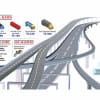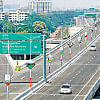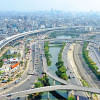PM opens country’s first elevated expressway
Prime Minister Sheikh Hasina today inaugurated the 11.5 km Airport- Farmgate segment of 19.73-km Dhaka Elevated Expressway, the first of its kind in the country, raising hopes of reducing traffic congestion and commuters' travel time in the capital.
The long-awaited expressway, one of the mega infrastructure projects under the current government, will be opened to traffic from tomorrow morning and it will take as little as 10 minutes for a vehicle, travelling at 60 kilometres per hour, to reach Farmgate from Kawla.
This is the first project in the transport sector being implemented under the public-private partnership (PPP) with foreign investment.
The expressway has been decorated with placards and flags, which will be removed before the opening of the structure to traffic at 6:00am tomorrow.
The car carrying the prime minister entered the expressway from the north end in Kawla area near the Hazrat Shahjalal International Airport after paying toll at the toll plaza there.
She will get off the expressway in Tejgaon area to join a civic rally at the old trade fair ground in Agargaon.
About 80,000 vehicles will be able to pass through the Dhaka Elevated Expressway every day, project officials say.
The expressway is expected to increase traffic capacity within and around the city by improving connectivity between the northern part of Dhaka city with the central, southern and south-eastern parts.
In addition to providing a much-needed increase in traffic capacity, the expressway will ease existing overloaded roads.
When fully completed, the Dhaka Elevated Expressway will run from the capital's Kawla to Kutubkhali area of Dhaka-Chattogram highway via Kuril-Banani-Mohakhali-Tejgaon-Moghbazar-Kamalapur-Sayedabad-Jatrabari, according to Road Transport and Bridges Minister Obaidul Quader.
Vehicles will have to pay tolls for using the expressway. Tolls will be collected in four categories.
Private cars, microbuses ((16 seats) and mini-trucks ((3 tonnes) will have to pay Tk 80, medium-sized trucks (up to 6 wheels) and large trucks with more than 6 wheels will pay Tk 320 and Tk 400 respectively.
Meanwhile, all buses and minibuses with 16 or more seats will have to pay Tk 160 to use the Kawla-Farmgate section of the expressway.
Motorcycles, bicycles and three-wheelers will not be allowed to ply the expressway.
The Dhaka Elevated Expressway project was undertaken in 2011. On December 15, 2013, Bangladesh Bridge Authority signed a revised agreement with First Dhaka Elevated Expressway Company Limited, the investment company of the project.
It is being built in partnership with Thailand-based Italian Thai Development Public Company Limited (51 percent), China Shandong International Economic & Technical Cooperation Group (34 percent) and Sinohydro Corporation Limited (15 percent).
The project is being completed in three phases. Ninety-eight percent of the first part up to Banani and 54 percent of the work from Banani to Moghbazar has been completed.
The elevated expressway will serve as an alternative road from north to south of Dhaka. It will connect Hemayetpur-Kadamtali-Nimtoli-Sirajdikhan-Madanganj-Dhaka-Chattogram Highway-Madanpur directly.
On the other hand, vehicles from the south-western region and the eastern region of the country will be able to enter the north-western region directly without entering Dhaka – reducing travel time and traffic congestion in Dhaka.
The project authorities said they have set up a control centre in the Kuril area for smooth movement of vehicles. Chinese firm China Shandong International Economic and Technical Corporation, one of the three private partners of the PPP project, will operate the control centre.
The Airport-Farmgate section via Kuril, Banani, Mohakhali and Tejgaon will serve as an alternative route to and from the airport, one of the busiest routes in the city.
This section with 15 ramps will help vehicles avoid traffic-choked crossings and roads. Thirteen of the ramps opened today.
Other vehicles will run on the structure at a maximum speed of 60km per hour at the beginning, according to sources.

 For all latest news, follow The Daily Star's Google News channel.
For all latest news, follow The Daily Star's Google News channel. 










Comments